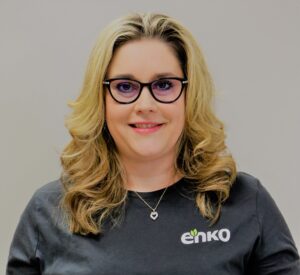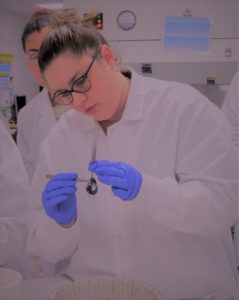First-generation alumna takes interest in science to Ph.D. in Toxicology

Dr. Brittany Baisch (Photo credit: ENKO Chem)
As a student at Southbury’s Region 15 Pomperaug High School, Brittany (Serke) Baisch enjoyed her studies in the sciences and Spanish. As the first child in her family to attend a university, she knew she’d have to attend college on a budget. Because she wanted to avoid debt and be financially independent, Baisch looked within Connecticut for her higher education options. “In-state tuition at public universities was much cheaper than out-of-state or private institutions,” Baisch said.
“Initially I thought that you get what you pay for, but I quickly realized that is not really the case,” Baisch added. “Top institutions are impressive, but when I asked older friends about their college experience, they told me that where you go does not really matter for getting a job or for a graduate-level degree — what sets you apart are your leadership skills, grades and work ethic. Also, you should build working relationships with people who can provide references.”
Baisch said she looked at several in-state universities. “UConn is a great school, but it was too big for me, and I would need room and board, which would have doubled the cost at that time. Western Connecticut State University was much more affordable, and I could save money by commuting. It was also attractive because it would provide me with access to Ph.D.-level professors teaching both labs and classes, and they hold office hours themselves. At larger institutions it is typical for teaching assistants to be more accessible than the professors, and there were hundreds of students in lecture halls. The large scale may appeal to some students, but I knew it would not work for me. Plus, WCSU was building a new Science Building, and I was majoring in chemistry and biochemistry, and looked forward to its state-of-the-art facilities,” she said.
In addition to her science studies, at WCSU Baisch also indulged her interests in culture and language, and did short-term study-abroad enrichment programs, including studying education and culture in Puerto Rico with Professor of World Languages and Cultures Dr. Alba Skar-Hawkins, and a monthlong arts and culture immersion in Spain with Professor of World Languages and Cultures Dr. Galina Bakhtiarova. Baisch also went on two short Italy trips organized by WCSU. She even participated in Southern Connecticut State University’s Public Health Study in Guatemala. “Being a science student, there is a misconception that you cannot study abroad because you cannot miss lab courses, but these experiences were over the summer so they were perfect.”
Her research in the Chemistry Department also gave her the opportunity to travel within the U.S. to American Chemical Society conferences. She learned presentation and networking skills, and applies them now to Society of Toxicology meetings, and holds leadership positions in various component groups.
Baisch graduated summa cum laude in 2008 with three WCSU degrees: a B.A. in Chemistry, a B.A. in Biochemistry and a B.A. in Spanish. She was a member of the Chemistry Club, Institutional Review Board and Sigma Delta Pi Spanish Honor Society; was on the Dean’s List regularly, and received several scholarships including the Henry Barnard Outstanding Student Award from the Connecticut State Colleges and Universities (CSCU) Foundation. “I applied for every scholarship. You do not get awards if you do not apply.”

Dr. Brittany Baisch (Photo credit: Institute for In Vitro Sciences)
Now a Ph.D.-level scientist herself, Baisch leads regulatory affairs and toxicology at ENKO Chem, an agrochemical start-up based in Mystic, Connecticut. It’s a job she has progressed toward ever since her roles as a student working part time in WCSU’s Chemistry Department, and as a Formulations intern at ATMI (now Entegris).
Upon graduation, Baisch wanted to get more involved with designing and leading scientific projects beyond the lab bench, and that would require a doctoral degree. Based on advice from Professor of Chemistry Dr. Paula Secondo, Baisch realized she could pursue a Ph.D. in the sciences with her tuition funded and a stipend to help with expenses. “A lot of undergraduates do not realize that in the STEM fields, a doctorate is typically funded by research dollars so you do not accumulate student loans,” Baisch explained. The search began to pinpoint her specific area of interest: Microbiology? Biotechnology? Pharmacology? Baisch discovered Toxicology — the study of the adverse effects of chemicals on human health and the environment — and settled on that since it was “a combination of all the sciences rolled into one.”
After researching Toxicology Ph.D. programs, Baisch applied to several, but the University of Rochester was at the top of her list. “It was the premier toxicology program in the country — heavily funded with students presenting research all over the world. The U of R reminded me of WCSU because it was smaller, and all the faculty were at the top of their fields,” Baisch said. “Plus, there was a close-knit student body and strong alumni network in various sectors — a lot of people to tap into to learn about job opportunities.” It took five years to attain her Ph.D., and Baisch said, “It was the most difficult thing I have ever done, but definitely worth it.”
Shortly after her thesis was successfully defended, Baisch started a job that she had lined up months prior, as a food Toxicologist for Kraft Foods in Chicago. “It was incredibly interesting — I learned so much about food ingredient safety and management. The food manufacturers truly work very hard to ensure the safety and quality of the world’s food supply. I had great mentors who worked there. It was exciting to be a part of the due diligence at Kraft, and to work with experts at other organizations. Food Toxicologists are very collaborative.”
A few years later, Baisch took the grueling American Board of Toxicology exam and passed it on the first attempt. “You need to know details of every aspect of toxicology and how to apply the principles to complex problems,” she said. “I spent a year preparing for the exam while working full time and having a young family. The exam made me realize how broad the field of Toxicology is, and that I was interested in other areas. I loved working in the food industry, but at the time I had moved on to a new role.”
At that time, Baisch was working at Sun Products Corp. in Trumbull, Connecticut. It was a consumer product goods company that manufactured laundry and dish household products that was later acquired by Henkel, and she started working on cleaners, air care products and consumer use pesticides. With these companies, she built and executed a product safety program for North America as the Principal Toxicologist, and later as the Research Fellow-Toxicology. She also gained a working knowledge of regulatory affairs. “As I grew in my career and was more involved with many projects, I became more business savvy. I enjoyed working with scientists from many disciplines as well as the legal and marketing teams to get safe products to market,” she explained.
In her current role as the Regulatory Toxicology Lead at ENKO Chem, Baisch said, “This role is in innovation. ENKO wants to develop crop protection products to help secure the world’s food supply. My goal is to design studies to predict which compounds are likely to pass safety and regulatory scrutiny. It is an exciting mission, and it is a lot of fun to work for a smaller company.”
As for her budget-friendly education, between working part time and the scholarship opportunities in the Region 15 school district, the CSCU Foundation and at WCSU, Baisch had very minimal debt from her undergraduate studies. She is now a member of the Board of Directors for the CSCU Foundation and has taught two courses as an adjunct at WCSU. Baisch said, “It is two ways that I have given back. I earned a lot of scholarships and opportunities, and I am forever grateful to those who provided them.”
Baisch’s advice to future students is to think about what subjects they like and why. “Do a self-exploration exercise. Talk to people who have that degree. What is their job like? You should enjoy your job and look forward to doing it every day — but you should also understand if you can make a living doing it.” For her part, Baisch is thankful that she is doing both.
Western Connecticut State University changes lives by providing all students with a high-quality education that fosters their growth as individuals, scholars, professionals, and leaders in a global society. Our vision: To be widely recognized as a premier public university with outstanding teachers and scholars who prepare students to contribute to the world in a meaningful way.

